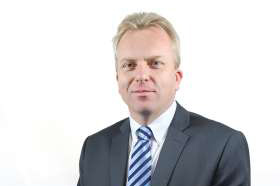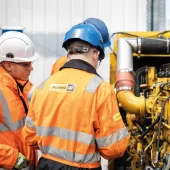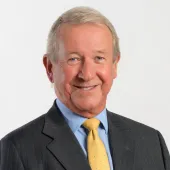Finning's Approach to Mobile Plant Fleet Optimization

First published in the May 2014 issue of Quarry Management as Effective Equipment
Managing mobile plant fleet efficiently, improving safety and reducing operational costs have become key challenges facing the quarrying industry. QM spoke to Jason Howlett, director of Equipment Solutions for Finning UK & Ireland, about the company’s integrated, holistic approach to fleet optimization and the importance of supplying bespoke solutions to help customers manage their equipment assets and associated costs
For years the industry has talked about how equipment can be managed effectively, how technology can help and what needs to be done to improve the bottom line, but it is only now with the recovery in the UK economy and construction industry that real equipment management is finally making a breakthrough.
Finning’s recent deals with Hope Construction Materials and Walters Plant, operating as a load and haul contractor for Aggregate Industries, demonstrate that the approach to mobile plant used in quarries continues to be very different. But no matter what the approach is – the fundamentals remain the same.
A key challenge for quarry operators is to achieve the lowest-cost-per-tonne production in the safest possible way, and an underlying message from Finning is to ‘use new techniques to stop machines idling and get earning’.
Jason Howlett, director of Equipment Solutions at the company, explained: ‘We all know that there have been significant improvements in plant fuel efficiency over the years and the introduction of technology systems, data capture, etc have been pushed into the industry with great enthusiasm.
‘This one-size-fits-all type of solution, however, does not take into account the real life pressures and issues that each customer has to overcome. No two sites or quarry faces are the same and no operator works in the same way as another. So, in turn, no item of plant has the same role to play from one site to the next, or performs in the same way.’
Finning have recognized that if their customers are going to manage equipment successfully, the company needs to support them with a bespoke solution for each site and, where possible, consider the opportunity to support other operations within the business, by having a more flexible fleet.
‘As experts in engineering, we are always looking at the bigger picture by developing close working relationships with our customers,’ said Mr Howlett. ‘This allows us to understand the business and operations but, more importantly, we are able to look at the fleet-optimization challenges in quarries and aggregate processing plants, which enables us to product and service match for the environment. We also need to simplify any solution and provide a service to support not just Cat equipment but mixed fleets.’
Finning firmly believe customers in the mineral products sector now want a lot more than just construction equipment with proven reliability, capability and eco-friendly performance. In the current marketplace, mobile plant operators are striving to reduce their operational costs, make efficiency gains, optimize productivity and deliver energy cost savings. With this in mind, quarry and mining operators are recognizing the value of a supplier that can provide both new and used equipment options, combined with technology, finance, rental and managed service solutions.
Finning’s technology and bespoke fleet-management packages allow customers to monitor, control and manage their mobile fleet to achieve maximum efficiency, flexibility and fuel efficiency.
Another key strength of the firm is the vast availability of resources on hand to meet these equipment challenges, which Mr Howlett believes gives Finning/Caterpillar a real competitive edge over their competitors.
‘We have invested heavily in the Finning brand to ensure the business has the right service and support infrastructure in place so we can provide a wide array of aftermarket offerings for our customers,’ he said. ‘We have the largest service centre network in the UK and we continue to focus on upskilling our strong team of Cat-trained, fully skilled engineers to ensure our customers are provided with ongoing support and the on-the-ground expertise they need.’
Finning have enjoyed great success working in partnership with customers in the quarrying and mining sectors, and Mr Howlett believes integrated teamwork between supplier and client is key to developing the right equipment strategy, from procuring and supporting the heavy mobile plant through to understanding the production volume cycles and annual tonnage forecast. In short, everything has to be considered.
‘What makes Finning different in this market is the relationship we have with the customer at all points in their business,’ he said. ‘Our engineers will get to know the machines and operators, while a Finsight monitoring team will interact with the quarry/plant managers. Our product specialists will support any equipment selection, a solutions team will consult on the latest best practice and our partners at Cat Finance will help find the right financial solution for each customer. The services and solutions across the entire range of plant ownership are tailored to meet ‰ individual requirements.’
Mr Howlett continued: ‘We believe equipment management starts first with understanding what the task is and how to make this as simple as possible. This is about consulting with the customer on quarrying best practice, and analyzing everything from haul roads to stocking areas and the working environment.
‘It also incorporates fleet operation, fixed and mobile plant interaction, maintenance and the future vision for the site(s). Only after this has been completed are we able to put a fleet plan together. One of the key elements to this planning process is how to transition an existing fleet to a new fleet, which does not necessarily mean new equipment.
‘For example, a recent Finning project involved rebuilding an entire fleet of off-highway trucks, to assist the customer with a cheaper option than replacing equipment. Similarly, because we have rebuild capabilities, we are now able to engineer solutions to finance both new and refurbished fleet options, giving the customer greater flexibility while optimizing productivity for lower plant cost.’
Equipment is one side of the coin, but the key to the success of any equipment-management strategy is the people and the quarrying industry as a whole. Mr Howlett explained: ‘We are fortunate to have a strong and progressive Institute of Quarrying (IQ) that supports the sector and helps to drive key areas such as innovation and safety. By continuing to collaborate on projects with the Institute and supporting campaigns, we hope to continue to help raise the importance and stature of the industry.’
The recent recognition of Finning’s Eco-Drive training programme by the IQ is a prime example of this collaborative approach. It highlights the significance of investing in training and people while raising the profile of those participating. Indeed, as technology becomes more advanced and specialized, and the range of heavy mobile equipment increases, the skills and competence the engineers and operators require are also changing.
‘Along with introducing newer Cat technology, equipment management is an area in which we can see real potential for growth and improvement for the business,’ said Mr Howlett. ‘However, if we are going to help customers optimize their fleet and equipment availability, improve performance and reduce the lifetime costs of ownership, we must ensure that our employees have the necessary skills, knowledge and competence.
‘Other projects currently under way with the Institute will also play a significant part in promoting skills, which is essential as everyone knows the potential negative impact a skills shortage could have on the industry. Finning will play a major role in supporting the sector when it comes to skills development, sustainability and eliminating waste through the practical implementation of new technology, training and on-site support.
‘We have to continue to upskill our workforce to meet the increasing demands from customers and I certainly see 2014 as a game-changing year in the aggregates industry when it comes to equipment-management solutions.’
Having spent the last two years developing this collaborative approach hand in hand with their customers, Finning will be revealing further details at Hillhead 2014, as well as showcasing the very latest in fuel-efficient equipment from Caterpillar.
Some of the new products on display will include the M-Series wheel loader range and 725 and 730 ADT models; the latter of which will be in action in the face demonstration area. Industry specialists will also be on hand to explain the advances in Caterpillar equipment and discuss key aftermarket service offerings, including the Just Add Diesel, Eco-Drive and Finsight initiatives.
‘Visitors to our stand at Hillhead will, for the first time, be able to get a much greater understanding of how the Finning business operates, particularly in the quarrying and mining sectors,’ said Mr Howlett.
‘For those already engaged, increased uptime, reduced operating costs, extended equipment life and preventative maintenance are all familiar phrases that will play a key role in achieving a competitive advantage. So, if there was one thing we could all do to make a difference, it would be to embrace equipment management to stop idling and get earning.’
- Subscribe to Quarry Management, the monthly journal for the mineral products industry, to read articles before they appear on Agg-Net






